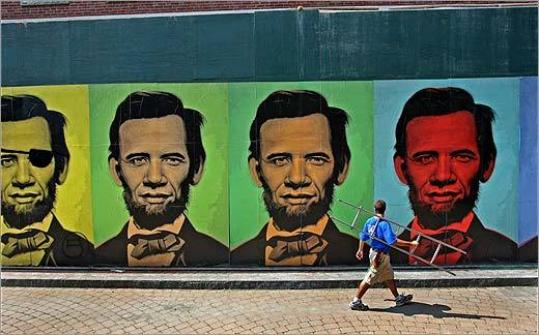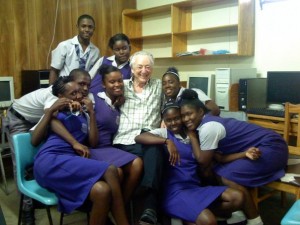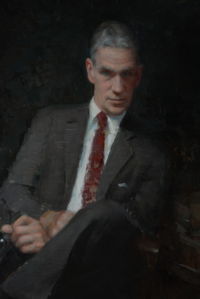my welcoming speech delivered through the net at the launch of SET in Ascot Highschool, Jamaica.
ascot-speech-2-23-09
Archive for the 'university' Category
Page 3 of 21
the lesson of the wire
i am pryzbylewski
david simon and prez, please come to harvard
we are teachers who want to teach poker in schools
to teach kids how the numbers work
we assert that those of you who want to hold us back are not good at numbers
just knot your thing
_eon_ assignment: watch prez teach kids numbers with dice: want to play numbers with freerice: who will do it live with jamaica: #openeducation
From: Cary Sherman
Date: Mon, Dec 22, 2008 at 3:09 PM
Subject: FW: AP: Music industry drops effort to sue song swappers
To: Charles Nesson
Hi Charlie.
Saw your comments in the AP story below. I hope you understand that we can’t just walk away from cases we’ve filed. Doesn’t mean we want to litigate everything, we’d obviously prefer not to. If you have any thoughts on a resolution, I’d be all ears.
Sorry I couldn’t tell you months ago that we were getting out of the lawsuits, but I’m sure you understand.
I hope you have a great holiday (and don’t have to spend the holidays working, now that you’re a litigator!).
Please give my best to Fern.
Cary
Music industry drops effort to sue song swappers
By RYAN NAKASHIMA – 27 minutes ago
LOS ANGELES (AP) — The group representing the U.S. recording industry said Friday it has abandoned its policy of suing people for sharing songs protected by copyright and will work with Internet service providers to cut abusers’ access if they ignore repeated warnings.
The move ends a controversial program that saw the Recording Industry Association of America sue about 35,000 people since 2003 for swapping songs online. Because of high legal costs for defenders, virtually all of those hit with lawsuits settled, on average for around $3,500. The association’s legal costs, in the meantime, exceeded the settlement money it brought in.
The association said Friday that it stopped sending out new lawsuits and warnings in August, and then agreed with several leading U.S. Internet service providers, without naming which ones, to notify alleged illegal file-sharers and cut off service if they failed to stop.
It credited the lawsuit campaign with raising awareness of piracy and keeping the number of illegal file-sharers in check while the legal market for digital music took off. With two weeks left in the year, legitimate sales of digital music tracks soared for the first time past the 1 billion mark, up 28 percent over all of last year, according to Nielsen Soundscan.
“We’re at a point where there’s a sense of comfort that we can replace one form of deterrent with another form of deterrent,” said RIAA Chairman and Chief Executive Mitch Bainwol. “Filing lawsuits as a strategy to deal with a big problem was not our first choice five years ago.”
The new notification program is also more efficient, he said, having sent out more notices in the few months since it started than in the five years of the lawsuit campaign.
“It’s much easier to send notices than it is to file lawsuits,” Bainwol said.
The decision to scrap the legal attack was first reported in The Wall Street Journal.
The group says it will still continue to litigate outstanding cases, most of which are in the pre-lawsuit warning stage, but some of which are before the courts.
The decision to press on with existing cases drew the ire of Harvard Law professor Charles Nesson, who is defending a Boston University graduate student targeted in one of the music industry’s lawsuits.
“If it’s a bad idea, it’s a bad idea,” said Nesson. He is challenging the constitutionality of the suits, which, based on the Digital Theft Deterrence and Copyright Damages Improvement Act of 1999, can impose damages of $150,000 per infringement, far in excess of the actual damage caused.
Nesson’s client, Joel Tenenbaum, faces the possibility of more than $1 million in damages for allegedly downloading seven songs illegally, which Nesson called “cruel and unusual punishment.” The case is set to go to trial in district court in Massachusetts on Jan. 22.
Brian Toder, a lawyer with Chestnut & Cambronne in Minneapolis, who defended single mother Jammie Thomas in a copyright suit filed by the RIAA, said he is also set to retry the case March 9 after a judge threw out a $222,000 decision against her.
“I think it’s a good thing that they’ve ended this campaign of going after people,” Toder said.
“But they need to change how people spend money on records,” he said. “People like to share music. The Internet makes it so easy. They have to do something to change this business model of theirs.”
—
——
when appropriate (in my judgment) to an open project and not sensitive (in my judgment) in terms of privacy, i may post email to my blog. all privacy requests respected.
From: Joel Tenenbaum
Date: Fri, Dec 19, 2008 at 8:52 AM
Subject: [cyberone-riaa] [Fwd: riaa]
Interesting…
“Indeed, many in the music industry felt the lawsuits had outlived their
usefulness.”
Power plays by the rules only when it suits its purpose
Now the court in Oregon is realizing it has some
Including the power to put their reality back in the face of authority
Power we think comes from on top
Power comes from within
Here’s an article in the new york times about Breyer listening and hearing what the Oregon judges are saying, speaking in their lawyer’s language about instructions to the jury, and Souter asking core questions.
Massachusetts, New Hampshire, Oregon
gotta love it
adam liptak
and then Roberts batting clean-up
where’s he from
home run
“Is there a way for us to ensure against a bad-faith response to our decision?”
Justice Souter asked. Chief Justice Roberts had an answer. Get to the issue at the core so that our decision earns respect. The Supreme Court has no troops to enforce its judgments on lower courts. Supreme Court authority is respect for law, which starts with judges understanding the true source of their power.
where is a transcript of this magnificent exchange
where is the audio/video
why do i not have this to teach to my class
today’s a busy day
here’s from matt:
Charlie,
I have class from 10am-12:45pm. Other than that I am available.
As a rough note to get things started, here is a (probably non-exhaustive) list of things we need to produce/discuss:
1. Request for leave to file reply to plaintiffs’ opposition to our amended counterclaim (ASAP!)
2. Request for leave to file reply to plaintiffs’ opposition to our motion to add RIAA (ASAP!)
3. Request for leave to file reply to plaintiffs’ opposition to our discovery plan (if we chose to do so, and if that is even possible… ASAP!)
4. Produce all three of those documents
5. Figure out what to do if we want to appeal the order against Tova to the 3rd Circuit (if we choose to do so)
6. Figure out how to comply with plaintiffs’ proposed discovery plan, because I think Judge Gertner probably will either adopt their plan or a modified version (provided we don’t/cant reply)
7. Figure out how to prepare all of the discovery stuff we’ll need to do soon anyway (esp. preparing expert reports on our experts)
8. How we’re going to handle the hearing in RI, including whether we’re going to request electronic recording
9. Finalize plans for our motion to allow electronic recording of the D.Mass proceedings
10. Decide how to distribute/coordinate all of this stuff with finals/Xmas break looming
~Matt
from shubham
-For the reply brief on the amended counterclaim (item 1 above):
A. Argue that the court does in fact have inherent federal authority to allow redress for abuse of process.
B. Argue that our state law abuse of process pleadings are sufficient to continue to trial
C. Argue that the first amendment cannot justify their litigation campaign
D. Unconstitutional delegation argument
E. Civil v. Criminal argument
F. Unconstitutional excessive damages argument
from doc searls
Another example of RIAA heartlessness:
legal_blog_watch/2008/12/callous-lawsuit-of-the-day.html
Cheers,
Doc
An Open Letter to the Community … and the McCain Campaign
Back in June, Presidential Candidate John McCain led the internet policy debate by offering to use the gold standard in search to help him find his ideal running mate: Google. His search must have turned up the YouTube videos of Ms. Palin’s former beauty pageant days or the latest www.palinaspresident.com new media because just a few weeks later, McCain double-clicked on the Alaskan Governor – and a Saturday Night Live imposter Tina Fey – to complete the Republican ticket.
But since then, McCain’s stance on internet policy has stood in the overcast shadow of Obama’s all-star team of prominent technology advisors. Sure, he has more clearly defined his technology policies than any other candidate (See http://www.techcrunch.com/2007/11/14/barack-obamas-google-friendly-technology-platform/). And sure he is a stanch supporter of net neutrality, and intelligent programs for increasing technology education and access to children.
But I was disappointed by a Berkman Center event last week speaking to the uncertain future of the open net that featured an Obama Advisor on a panel that failed to even acknowledge a second presidential candidate until the waning moments of the meeting.
So what if Google’s CEO is now campaigning for Obama? (see http://online.wsj.com/article/SB122446734650049199.html)
I would like to level the playing field by offering my services as internet advisor to McCain.
I would like to speak to the audience of the Berkman Center, to Barack Obama and his supporters, and the John McCain and his. As John McCain’s Internet Advisor I advise to support in your platform the Wheeler Declaration
http://wiki.freeculture.org/Open_University_Campaign – The_Wheeler_Declaration
built on the freerice plan
http://freerice.com
and who is better on copyright, mccain or biden, and don’t tell me that’s irrelevant. my students want to know.
eon
mccain
sitting with position on obama
waits for obama to make his play
biden
not hillary
what does that say
biden
what does that say
to whom is he speaking
mccain sees a tell and makes his play
palin
all-in with palin
straight talk rollin
mccain the maverick fighter
alaska woman at his side
choo choo who do you choose
obama seen and raised
action now to him
:<)
CHARLES NESSON: I start from a presumption of liberty. Think of the founders of our nation. They assembled as people who had the liberty to create a government. They knew that historically all governments reflect their own self-interest and come over time to limit, if not destroy the collective power of the people. They believed that a government built of checks and balances would ensure protection of their (and our) liberty into the future.
One method for doing this was to provide that the government must present its case for taking away a citizen’s liberty to a jury of peers, and that the jury must unanimously agree to a general verdict of guilt as warrant for the State to take his liberty. The jury will endure as a bulwark so long as it decides the whole case — the law and the fact. When all other balances fail, the jury will remain as the last protection of liberty.
In a criminal prosecution the legislature must first pass a statute that defines a crime. The executive must then choose to enforce the statute by formally charging and proving a statutory violation. Finally the judiciary must oversee the trial of the charge to make sure the statute is constitutional and the process of proof completely legal. Thus the state”s claim to take the liberty of a citizen is presented to a jury of the people. WE the PEOPLE. The jury is us, so that our values of liberty and justice will be preserved into the future against the state.
I want to make a doctrinal point exposing the flaw in the legal argument used by the judiciary to take away the jury’s power to decide “the whole case, the law and the fact,” thereby reducing the jury’s role to that merely of factfinder. “Law” used in describing the jury’s role means justice in the sense of connection with the conscience of community. The judges who created the current doctrine of jury nullification read “law” to mean the formal law created by the State, e.g., legislation, common law, judicial precedent. In claiming for themselves in a dichotomy between judge and jury of “law” and “fact” the prerogative of authoritatively articulating such matters of legality they left the jury only with “fact” and took the jury’s justice function away.
The judges did this in the 19th century in dispute as to whether lawyers could continue the established practice of arguing unconstitutionality of statutes to the jury despite the trial judge’s ruling that the statute was constitutional. Judges decided that lawyers may not re-argue their legal rulings to the jury because it is the judge’s business, not the jury’s, to decide matters of law. But in every case, the ruling was based upon the judges power to decide constitutionality and other legal matters. It resolved the question insofar as it applied to constitutional matters, statutory interpretations and evidentiary rulings — matters of legality. But it did not address, nor did it justify, the claim that juries had no business deciding “law” in the more fundamental sense.
Even after the “legalities” have been articulated by the judge to the jury, the jury hears and must accept the interpretation of the law of the state that the judge puts upon it, the jury nonetheless retains the essential independent function and responsibility of deciding whether to apply the state’s law to the defendant before them. That is the jury’s constitutional function. That is its protective check and balance versus the state’s power to deprove a citizen of liberty. To take this funtion away diminishes, even obviates, the jury’s function as the last bulwark of liberty.
All right, that’s my ten minutes. I’d be delighted with any and all comments.

ABRAHAM_OBAMA POKER PARTY wednesday night at GALLERYXIV
exciting news. at our ABRAHAM_OBAMA party wednesday will be andrew brokos, my best living proof next to howard lederer that poker is a game of skill, known online as foucault, the poker philosopher. who is currently playing in the world series of poker. he is returning to boston on monday and will come to our party. it’s a great opportunity for us to hear his stories and celebrate his achievements at the tournament. if you know anyone who would be interested in meeting him or playing poker please invite him or her to join us at galleryXIV 450 harrison st in the south end at 7pm on Wednesday JULY !6 2008. fern and i will provide wine beer snacks. and hopefully music. please respond with thoughts suggestions contributions of any sort and please try to attend. we’ll have a lot of fun.


early morning, yesterday the ladies of fort augusta, the men of tower street, anders jones for 30 rebuilt cpu’s and we are ready.
kevin led at tower street by putting forth the ideal of group integrity on starting on time. he led the members of his SET to, no, i’m not going to describe it because it would become a silly form, yet to me illustrates the idea that a master of technique has no technique, it is the informing principle that moves him, and even when it’s not articulate with him the direction of it is clear to see in context. tic tac toe at tower street.
at fort augusta we made a wish list, simple things, like construction paper and ink and better machines and an fm transmitter
kevin is expanding unchained from one to two hours. gpsts is signing on as a sponsor.
berkman center is sponsoring an audio book SSET reading group for officers and inmates on FREE FM.
i’d like a spiffy ad for gpsts to air on jamaica radio in the first instance
in second instance in second life in video form
i’d like a spiffy ad not for internet and society, global voices
***
here are camella & kevin doing radio
***
This is an open letter to the prime minister:
I have a suggestion in response to the Observer’s May 30 front-page story, “Do something!” Express the true identity of Jamaica by undertaking a cyber campaign to legalise marijuana in Jamaica.
Here is my suggested cyberstrategy:
(1) Recognise that Jamaica is legally obligated under its devolution from England to honour England’s treaty obligations.
(2) Recognise that England formed a treaty obligation to the Maroons to allow them their lives and their freedom in the mountains in exchange for their commitment to become the slave police.
(3) Recognise that freedom in the mountains includes liberty to grow and use the herbs of the earth, including ganja.
Legally speaking, this means that Jamaica as a sovereign nation, and you as its prime minister, are obliged to respect the liberty of the Maroons to grow and use ganja.
But “legally speaking” fails to take into account the reality of political opposition. Were you simply to recognise this legal treaty right of the Maroons, you would meet opposition from prohibitionists in Jamaica and incur the wrath of the United States of America. A further strategy is needed to raise public consciousness in a manner calculated to win popular support of both the Jamaican and American people.
(4) Recognise that we are all Maroons. Seek a legal declaration of rights and obligations under the treaty of the Maroons from the Privy Council. Bring the issue to the attention of Jamaica and the rest of the world.
(5) Conduct a digital referendum of the people of Jamaica and America and the world on the issue: “Should the United States of America use its power to prevent Jamaica from recognising the freedom of its people to grow and use marijuana?”
(6) Exercise your executive authority to stop all active enforcement of ganja laws in Jamaica pending a decision from the Privy Council. Explain this action and campaign to enhance Jamaica’s place in the world and lessen crime at home.
Charles Nesson
nesson@gmail.com




